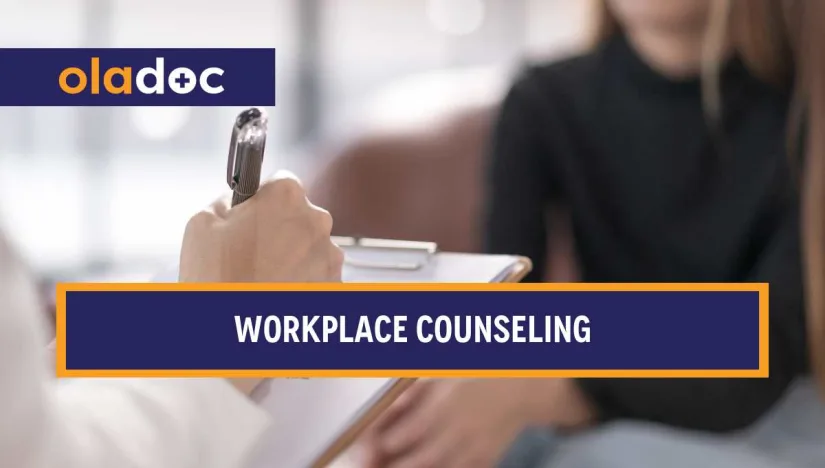Workplace counseling is a process that is essentially a talking therapy, where individuals share their thoughts and feelings with a professional.
The whole process helps people to resolve what is troubling them and can develop a strategy to deal with the thoughts in a healthy way.
During counseling, the sessions are confidential and are approached with an open mind; however, there is still a degree of taboo surrounding it.
Discussing your mental health is often perceived as a sign of weakness. That is where the role of a counselor or therapist comes into play to reduce the stigma associated with mental health counseling.
Table of Contents
Key Takeaways
- Counseling at the workplace supports employees to manage stress, resolve conflicts, and improve emotional resilience.
- Types of counseling include directive, non-directive, and participative counseling.
- Counseling takes place in a private setting to explore issues and improve coping skills or strategies.
Types of workplace counseling
The following are the details of the types of workplace counseling:
Directive counseling
This is the most comprehensive type of counseling. It involves hearing the details of an employee’s problem, agreeing with the employee on what to do, and then clearly communicating and motivating the employee to do it.
The main functions of this type of counseling are advice, reassurance, and communication.
Non-directive counseling
This approach involves allowing maximum freedom for an employee to guide the course of the interview. It allows the counselor to skillfully listen and encourage the person to discuss troubling issues, clarify the issue, and discuss solutions.
Fundamentally, this is accomplished by listening and understanding without criticism or judgment of the issue.
An employee who has had an opportunity to express suppressed emotion is generally in a better position to consider the situation more objectively and with a better problem-solving attitude.
Participative counseling
Participative counseling is a a cooperative process where counselor and employee share ideas and discuss problems together.
It is neither completely counselor-centered nor completely employee-centered. The counselor and employee will use their different knowledge, perceptions, skills, perspectives, and values to address the problem and to explore solutions.
Both directive and non-directive methods have their limits. The former is often resisted by independent employees, while the latter requires professionals which can increase costs. Hence, most of the time, the middle ground is adopted, that is, participative counseling.
How does workplace counseling work?
The primary purpose of providing workplace counseling is to give employees a guaranteed space to seek support and assistance. To ensure counseling is effective, management must address its learning and seeking support. First, management must assure its employees of its necessity and effectiveness.
Workplace counseling works in the following ways:
1. Concerned employee seeks support
The employees needing counseling will first reach out to the counselor. This could be through a website, a helpline number, or an online session.
Something to note is that distressed employees may not always be willing to reach out for help due to stigma. Thus, some employees may need a nudge to receive the help they need. Colleagues who work closely with them, or their manager, can refer them to counseling sessions.
2. The employee goes through an assessment
Once the employee reaches out to the counseling service, they go through an assessment. The assessment helps the counselor understand the employee’s distress. From there, the counselor will be able to put together the needed counseling sessions for the employee.
3. Counseling sessions begin
Generally, employee counseling will cover stress management, communication skills, coping skills, conflict resolution, mental health issues, and so on. After the assessment, the counselor will set the number of sessions necessary for the concerned employee.
Is workplace counseling effective?
Workplace counseling is beneficial as it helps employees cope with stress, promotes emotional well-being, and increases job performance.
According to research, workplace counselling has a positive effect on psychological symptoms, overall well-being, and sickness absence.
Seeking counseling provides a confidential space for employees to discuss work-related issues openly and resolve them in a constructive way.
Counseling can also reduce employee absenteeism, promote employee morale, and increase productivity. Overall, workplace counseling contributes to a healthier and more supportive work environment.
Conclusion
To summarize, workplace counseling can promote employee well-being and effectiveness, and actively contributes to a positive workplace culture.
Counseling can help with stress management, conflict resolution, and enhancing job satisfaction within the workplace.
The organization benefits from healthier, motivated teams that drive productivity in the workplace. Counseling is a wise investment when considering its long-term benefits.
Frequently Asked Questions (FAQs)
Yes. The session is private, and information is never disclosed later to the employer unless consent is provided.
It is generally provided by a trained counselor, psychologist, or Employee Assistance Program (EAP).

